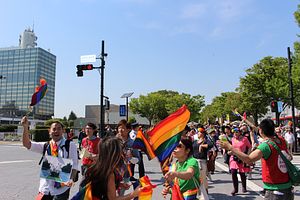Last Sunday in Japan saw the Tokyo Pride Parade, which kicked off the 2014 Tokyo Rainbow week. This was the third holding of the annual Tokyo Rainbow events and the 20th anniversary of the first gay pride parade.
In Tokyo’s Yoyogi Park, booths and stage performances started at 11 a.m., with the parade at 1:30 p.m. About 14,000 attended the event, with around 3,000 joining the parade.
According to the organizer, the parade aims at drawing more attention towards problems of the LGBT community and making the venue a safe place for all to celebrate diversity.
First Lady Akie Abe showed up on a float, waving to the crowds. She is involved in gay right and combating AIDS as a committee member of UNAIDS.
“I want to build a society where everyone can live a happy, enriched life without discrimination,” Abe wrote on her Facebook page shortly after the parade.
“I enjoyed spending the time filled with smiles. Thank you very much,” she wrote.
Various corporations and embassies set up booths at the event. A special booth was established for families to pay tribute to LGBT individuals who had passed away.
In Japan, about 5.2 percent of the population belongs to sexual minority, according to Sankei News, the majority lesbian, gay, bisexual or transgender.
Twenty years after the first “Tokyo Lesbian Gay Parade,” the event now attracts much more attention and has a more cheerful vibe.
The sponsor of the first parade, Teishiro Minami remembers that he had received several late-night phone calls before the event in 1994. He was pressured to stop the parade.
“There were fewer than 50 of us in the beginning, but by the finishing point, there were more than 300 people who had joined us. I have deep respect for those who make the event continue,” he says.
While the community has certainly come a long way, obstacles remain.
Article 24 of the Japanese Constitution stipulates that marriage must be based on the “mutual consent of both sexes,” which hinders the legalization of same-sex marriage in Japan.
“Unlike the U.S. and other countries, there is no religion-based discrimination or hatred of sexual minorities in Japan. However, there is insufficient knowledge and awareness,” said Patrick Linehan, U.S. Consul General in Osaka.
As a gay man, he reported encountering more puzzlement rather than discrimination in Japan.
However, the organizers of Tokyo Rainbow Week have big plans in mind for Japan. In 2020, 50 years after the first gay pride parade in New York, they hope to make Tokyo’s Rainbow Week an international one, sending their message to the world through the Tokyo Olympics.

































